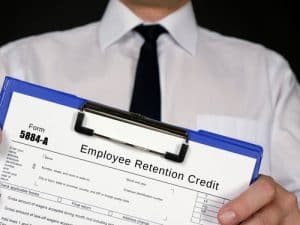Want to file for the Employee Retention Tax Credit but are wary of scams? Read this guide to protect yourself from ERC scams and fraud.

On 1/10/24, IRS Commissioner Daniel Werfel announced that the IRS is continuing to improve and automate ERC review procedures and will begin processing new ERC claims in the spring following the moratorium implemented in September. Existing claims are still being processed and eligible businesses can still submit an ERC claim through reputable ERC companies to be processed when the moratorium ends. Visit our full breakdown of the ERC pause for the latest information.
The Internal Revenue Service has recently warned about ERC scams as more small business owners are taking advantage of this tax credit. The employee retention credit (ERC) is a tax credit that can result in thousands of dollars back for small business owners — unfortunately, scammers are after this money too.
How do you avoid being scammed if you’re a small business owner who has claimed or is planning to claim the ERC tax credit?
In this post, we’ll provide the latest information on what ERC scams are, how scammers are tricking taxpayers, and how to avoid and report ERC scams before they affect your business.
What Are ERC Scams?
ERC scams involve a third-party company or individual contacting small business owners about claiming the ERC. These scammers tell small business owners that they qualify for the ERC or qualify for a higher refund without verifying eligibility, documentation, or other information.
Scammers may claim to be accountants, tax professionals, or even representatives of the IRS.
These third parties request a payment upfront in exchange for claiming the ERC on behalf of the small business owner. Or they work as ghost preparers to help business owners complete their tax returns and have the refund sent to their own direct deposit or mailing address instead.
The problem is that these companies and individuals are fraudulently filing ERC claims. The small business owner may not qualify at all, or they may not qualify for the full amount promised by the scammer. When the IRS discovers this, the small business owner will be responsible for repaying any refund overages and other penalties.
While the IRS may pursue the third-party scammer, the small business owner whose name is on the claim will ultimately be held responsible.
Luckily, there are several trustworthy ERC funding companies available to help you. We’ve also put together even more tips to help you avoid ERC scams and fraud.
Common Types Of ERC Scams
There are several types of reported ERC scams. Here are the most common ERC scams and how to spot them.
ERC Ghost Preparers
Ghost preparers pose as tax professionals and help small business owners prepare their tax returns, or in the case of the ERC, their amended tax returns. Ghost preparers either ask for money upfront in cash, or they fudge the taxable income and deductions for business owners to increase the size of their refund and then sneak their direct deposit information or mailing address into the tax return.
The tell-tale sign of a ghost preparer is that they refuse to sign the tax return as the tax preparer so that they can vanish without a trace, taking the taxpayer’s hard-earned money with them. Learn how to spot the signs of a ghost preparer and how to report them to the IRS.
ERC Mills Mass Filing False Claims
ERC “Mills” are companies that are mass filing erroneous ERC claims. These companies may call small business owners to let them know that they are eligible for the ERC, or in some cases, there have been reports of ERC Mills filing amended tax returns without a small business owner knowing until that business owner receives an audit notice from the IRS.
ERC Phone Call Scam
A popular phone call scam has been occurring where fraudulent companies call small businesses and tell them they qualify for the ERC. The ERC is a tricky tax credit with many strict guidelines, and not every small business is eligible, so anyone claiming that they can guarantee an ERC credit without knowing your business’s history is a major red flag.
ERC Identity Theft Scam
There have been reports of identity theft alongside the ERC from multiple news sources and articles. While finding solid details on these reports is difficult, we included these claims in this article so that business owners can be aware of this as a possibility and keep an extra eye on their credit reports and bank statements to rule out any signs of identity theft.
Look For These Red Flags To Identify Potential ERC Scams
If you’ve been contacted by a business or individual that promises an ERC refund, a few red flags can help you identify a scam. Be wary of companies that:
- Don’t have an online presence or appear to be a very new business
- Only want to communicate through email or online chats
- Promise to get you an ERC refund or a higher refund without reviewing your records
- Don’t offer audit protection
- Apply high-pressure tactics, such as frequent phone calls or short deadlines to file
- Include disqualified employees to get a higher credit
- Fudge the numbers to falsely increase your taxable income or deduction amount
- Refuse to sign their name as the preparer of your amended return
- Ask for payments upfront
- Require a large fee (more than 15% of your ERC credit)
Do your research, trust your gut, and always seek the second opinion of a reputable professional before engaging in business with any ERC funding company.
A trustworthy ERC company may ask for a 10%-15% fee on your refund to compile and file your ERC application, but they will never ask for this payment upfront. Reputable ERC companies only take their cut after you’ve received your tax credit from the IRS.
5 Tips On How To Avoid ERC Scams
Let’s be clear that the ERC itself isn’t a scam, and many third-party ERC services are also completely legit.
Instead, some bad actors are looking to take advantage of small business owners.
Here’s how to identify these scammers and how to avoid ERC scams.
Talk To An Accountant About The ERC
Before working with anyone who promises ERC refunds, talk to your accountant or research reputable accountants in your area to discuss the ERC. If your accountant tells you that you don’t qualify for the credit, but another company pushes you to claim the credit, it’s best to trust your accountant.
An accountant can help you understand if you qualify for the ERC (more on that in a minute) and how much you qualify to receive. A trademark of a scammer is telling you that you qualify without looking at your payroll records or gross receipts or giving you an inflated refund amount that doesn’t align with your accountant’s (or your own) calculations.
Pro Tip: Since you, as the taxpayer, are ultimately responsible for your tax return, if you work with a third-party ERC preparer, double-check their math by learning how to calculate the ERC credit yourself.
Understand How To Qualify For ERC
While it’s wise to talk to an accountant or other ERC expert, do your research about the ERC. With a basic understanding of how to qualify for the ERC, it’s easy to weed out scammers.
For example, if you don’t have any employees, but someone is telling you to file anyway, this is a sign of a scam. If someone gives you an estimate of your ERC refund without reviewing your records, you’re likely dealing with a scammer.
Do Your Research On ERC Funding Companies
Unfortunately, scammers have given ERC funding companies a bad reputation. (I mean, it’s because of scammers that the IRS paused processing claims!) While you need to be on the lookout for sketchy scam artists, it’s important to know that there are legitimate ERC funding companies.
If you opt to hire a third-party company to claim your ERC, make sure to do your research. Look at reviews, time in business, Better Business Bureau complaints, and other information to determine if a company is legit.
You can start your search for a reputable company by checking out the best ERC services for businesses or searching our reviews on the most popular ERC companies.
Don’t Pay Cash Upfront To ERC Funding Companies
Some ERC scammers get their money from their victims by demanding payment upfront. This leaves the small business owner waiting months (or even as long as a year) to receive their refunds. Even worse, these refunds could be found to be fraudulent, and the small business owner is left to repay the refund plus any penalties imposed by the IRS.
Let’s clarify that ERC funding companies charge fees for their services. But most reputable companies will take their fee only after the refund has been issued. Others may offer an option to pay upfront in exchange for lower fees. However, this may also be a sign of a scam. The only company we know of that offers this option and is still reputable is ERC Specialists, which gives a 100% cash-back guarantee for any upfront ERC payments.
Make sure to do your research and be wary of any business requesting payment upfront to claim your ERC, especially if there are other red flags.
Claim The ERC Yourself
Of course, you can always claim the ERC for yourself if you qualify. Instead of relying on a third-party company to claim your ERC, you can file your own amended quarterly return.
While it can be challenging to calculate your ERC and correctly fill out Form 941-X, it isn’t impossible — and you don’t run the risk of being scammed.
Learn more about how to claim the ERC on your taxes if you want to go the DIY route.
How To Report ERC Scammers
Some businesses have reported receiving fraudulent communications from the IRS about the ERC. These phone calls or emails may pressure recipients to apply for the ERC, even if they aren’t eligible.
If you receive an email from the IRS that you believe is fraudulent, you can report it by forwarding it to [email protected]. You can also file a formal Form 14157, Complaint: Tax Return Preparer, and send it to the IRS.
If you receive a phone call from the IRS, hang up and contact the IRS at 1-800-829-1040.
Additionally, if you suspect you are the victim of an ERC scam and do not meet the ERC eligibility requirements, then you may be able to withdraw your ERC claim to avoid penalties.
How To Stop ERC Spam Calls & Other Communications
Everyone wants to cash in on ERC — including ERC companies that charge business owners a fee for claiming the credit on their behalf. Unfortunately, as a result, these companies often cold-call, send numerous mailers, spam email inboxes, or send numerous communications to business owners.
These business owners may have signed up for a free ERC analysis or, in some cases, didn’t contact anyone at all. For example, there are numerous negative reviews about unsolicited ERC Pros phone calls, emails, text messages, and mailers.
If you’re getting bombarded with ERC phone calls, texts, emails, or mailers, here’s what to do to stop these communications.
Direct Contact
One of the simplest and most effective ways to stop ERC spam is to contact the company directly. You can do this by phone, email, live chat, social media, or any other method of contact provided by the offending company.
Unsubscribe To Emails
If you’re receiving numerous unwanted emails, scroll to the bottom of the email to look for an “Unsubscribe” button. Follow the onscreen prompts (which may include inputting your email address or selecting a reason for unsubscribing) to remove your email from a company’s mailing list.
Report Spam
If there’s no option to unsubscribe or you continue to get bombarded with emails, report it as spam through your email provider. This option is typically available right from within the email.
If you use Gmail, for example, open the email and click the exclamation mark at the top of the screen. Doing this allows you to not only report the email as spam but also unsubscribe.
Block Phone Numbers
If you receive unwanted calls and/or texts, you can simply block the phone number that is contacting you. There are a few ways to do this:
- Block the number directly from your phone settings
- Download a call-blocking app
- Contact your carrier
Be aware, however, that some companies use multiple phone numbers to contact you, so each number will need to be blocked.
Respond To Text Messages
In most cases, you should be able to easily stop unwanted text messages by simply typing the word “STOP” in response to a message you receive. Most companies will send a confirmation text to verify that automated text messages will no longer be sent to your phone.
Return To Sender
If your mailbox is overflowing with junk mail from ERC companies, you can return to sender. In order for this to work, the mailer should have one of the following:
- A return address
- Phrases such as “address service requested” or “forwarding service requested”
If the mail contains either of these, simply write, “Refused, return to sender,” and put the mail back in the mailbox.
The Bottom Line On ERC Scams
Employee retention is a legitimate tax credit that can help small business owners put thousands of dollars back into their pockets. Unfortunately, not every small business qualifies for the tax credit, and ERC scammers are taking advantage of this.
While the promise of a big refund seems alluring, these scams can ultimately be very costly for your business.
You can avoid these scams by knowing what to look for, doing your research, and even tackling the ERC yourself. We hope this information helps you and your business stay safe out there!
FAQs About Employee Retention Credit Scams
Is the ERC real?
The employee retention tax credit, or ERC, is a real tax credit available to qualified small business owners. This refundable tax credit could be filed on quarterly returns in 2020 and 2021. Small business owners who didn’t know about this credit can retroactively receive a refund by filing amended tax returns.
Are ERC funding companies legit?
There are many ERC funding companies that are legit like ERC Specialists, Omega, and Lendio. These companies will help you receive your ERC refund in exchange for a fee. However, some companies are scamming small business owners, so always make sure to do your research to find a reputable company.













